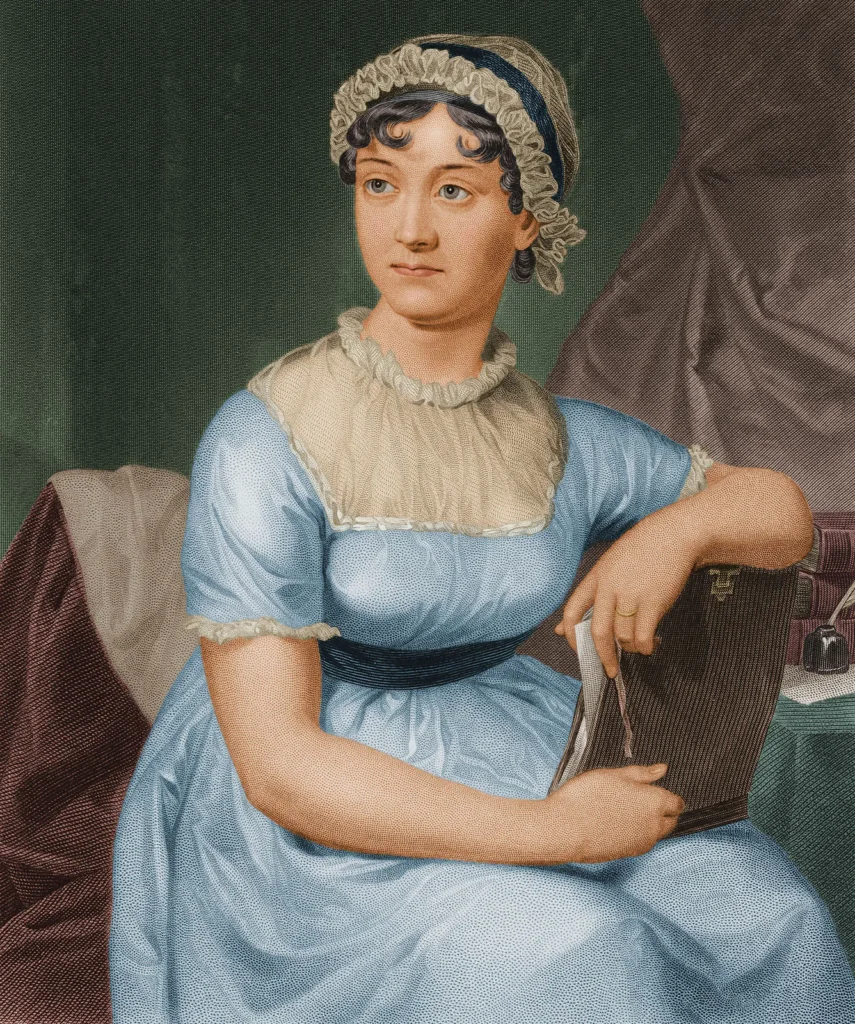BY Jane Austen
Character sketch of Jane Austen

English novelist Jane Austen (1775–1817) is well known for her six seminal works that analyze, evaluate, and make observations about the British landed aristocracy at the close of the eighteenth century. The timeless themes of love, class, and morality found in Jane Austen’s works, such as “Sense and Sensibility,” “Pride and Prejudice,” and “Emma,” are praised for their realistic portrayal of contemporary society and their acute social commentary. She describes Mr. Bennet (character of pride and prejudice) as a man of sarcastic humor and limited patience. Austen was described as having a small build, a bright, intellectual face, and a modest, unassuming manner.
Her books frequently include strong female leads who, with a sharp sense of humor and an acute understanding of human nature, navigate the expectations and social mores of their era. She was well-known for her bright mind, quick wit, and love of talk. She and her family and friends would frequently get into animated debates.
Austen’s writing displays a profound awareness of human nature and a sharp insight into the complexities of relationships and social dynamics, despite the limits she faced in her society as a result of her gender and social station.
The subtleties of human conduct and society are reflected in Austen’s characters, which are frequently intricate and multifaceted. Her heroines often defy the conventional gender stereotypes of their era and are strong-willed, bright, and independent-minded. Irony, humor, and social satire are hallmarks of Austen’s literary style, which she employs to highlight the ridiculousness and hypocrisy of the society she lived in. All things considered, one of the best English novelists, Jane Austen is still read and appreciated for her wit, wisdom, and timeless relevance in her writings.
Jane Austen, a 19th-century engraving likely derived from a portrait by her sister, Cassandra Austen, c. 1810.
Introduction
Jane Austen’s novel “Pride and Prejudice” was first released in 1813. It follows the story of Elizabeth Bennet as she navigates issues of manners, upbringing, morality, education, and marriage in the society of the landed gentry of the British Regency. The novel explores themes of love, reputation, class, and the role of women in society. “Pride and Prejudice” is one of Austen’s most popular works and has been adapted into numerous films, TV series, and other forms of media.
The five daughters of Mr. Bennet, the owner of the Long bourn estate in Hertfordshire, are barred from inheriting his land, which may only go to a male heir. When he passes away, his wife won’t have any inheritance either, therefore his family will be in dire need. One of the main motivations propelling the plot is the need for at least one of the daughters to marry nicely in order to support the others. Literary experts and general readers’ lists of “most-loved books” have repeatedly placed Pride and Prejudice in the upper echelons. With over 20 million copies sold, it has emerged as one of the most well-known novels in English literature and served as an inspiration for numerous contemporary literary ripoffs.

Colin Firth and Jennifer Ehle in Pride and Prejudice. Colin Firth and Jennifer Ehle in the TV miniseries Pride and Prejudice (1995).
© 1995 BBC
Characters
Pride and Prejudice centers on the Bennet family, which consists of five very different sisters, and is situated in rural England around the turn of the 19th century. Jane, the oldest, is modest and has a nice disposition. She is a friend and confidante of her sister Elizabeth. The book’s protagonist, Elizabeth, is bright and vivacious. She agrees with her father that wealth and status are not as important as they once were. The two youngest daughters, Lydia and Kitty, are flighty and immature, while the third daughter, Mary, is simple, bookish, and conceited.
Mr. Bennet is the family patriarch. He is fond of his two eldest daughters—especially his favourite, Elizabeth—but takes a passive interest in the younger ones, ultimately failing to curb their childish instincts. An intelligent but eccentric and sarcastic man, he does not care for society’s conventions and mocks his wife’s obsession with finding suitable husbands for their daughters. However, as other scholars have noted, Mrs. Bennet has valid concerns. William Collins, the nephew of Mr. Bennet, is the next male in line to inherit the tiny family estate due to an entail. Indeed, as Austen scholar Mary Evans noted, “If Mrs. Bennett is slightly crazy, then perhaps she is so because she perceives more clearly than her husband the possible fate of her five daughters if they do not marry.”
Sadly, Mrs. Bennet’s zeal and insensitivity frequently serve to undermine her goals. She is a self-pitying woman with little sense who spoils her energetic youngest daughters.
The Bennet sisters come across a number of attractive bachelors throughout the book, including Collins, Lieutenant George Wickham, Darcy, and Charles Bingley. Recently, Bingley leased the Nether field estate, which is close to the Long bourn residence of the Bennet family. He was described by Austen as “beautiful and gentlemanly; [having] a pleasant countenance and easy, unaffected manners. “His income came from his family’s trading business, which was viewed as a less honorable means of acquiring wealth than his friend Darcy’s inheritance.
It is obvious that Darcy is a product of this hierarchical mindset because he considers the wealthy landed aristocracy to be inherently superior. He is conceited but wise. Wickham’s father used to oversee Darcy’s properties, but the two are no longer on good terms. Because of his attractiveness and charm, Wickham quickly gains the favor of the ladies in Meryton, the nearby village where he and other soldiers have been stationed. Conversely, Collins is “not a sensible man, and society and education had done little to assist the deficiency of nature.”
Wickham’s father used to oversee Darcy’s properties, but the two are no longer on good terms. Because of his attractiveness and charm, Wickham quickly gains the favor of the ladies in Meryton, the nearby village where he and other soldiers have been stationed. Conversely, Collins is “not a sensible man, and society and education had done little to assist the deficiency of nature.” He is a clergyman, and Darcy’s aunt is the domineering Lady Catherine de Bourgh, her patron.
Other supporting characters in the book include Charlotte Lucas, Elizabeth’s friend, who is described as sensible and getting close to the age when marriage is unlikely; Sir William and Lady Lucas, Charlotte’s parents; Edward Gardiner, Mrs. Bennet’s brother, and his wife, who are both generous and grounded; the snobbish and cunning Caroline and Louisa Hurst, the sisters of Bingley; and Georgiana, Darcy’s 16-year-old sister, who is painfully shy but good-humored.
Summary
A well-known quote from English literature begins the novel: “It is a universal truth that a single man in possession of a good fortune, must be in want of a wife.” Mrs. Bennet appears to be thinking this as she fixes her gaze on the just arrived Bingley, whom she believes will be a good match for one of her daughters. Bingley is instantly drawn to the shy and attractive Jane during a ball. Elizabeth and his buddy Darcy have a less amicable encounter. Despite the fact that Austen depicts them as being attracted to one another, she breaks the custom of first impressions: Pride in status and wealth, as well as prejudice against Elizabeth’s family’s social inferiority, keep Darcy far, while Elizabeth herself is held at arm’s length by pride in her own dignity and prejudice against Darcy’s condescension.
Soon after, the haughty Collins shows up with plans to wed one of the Bennet sisters. Elizabeth declines his proposal of marriage, despite Mrs. Bennet’s efforts to direct him toward her. Rather, he proposes to her friend Charlotte. Elizabeth meets the endearing Wickham during this period. The two are attracted to one other, and he tells her that Darcy has refused to give him his fortune.
Elizabeth’s distaste for Darcy grows after Bingley unexpectedly leaves for London because she thinks he is trying to break up Bingley and Jane’s romance. But Darcy has come to like Elizabeth more and more, finding her bright and lively. Elizabeth visits Darcy, who declares his love for her and makes a proposal, while she is visiting the now-married Charlotte. When Darcy presses for an explanation, an astonished Elizabeth declines his offer and charges him with severing Jane and Bingley’s relationship and depriving Wickham of his fortune.
Later, Darcy writes Elizabeth a letter explaining that he split up with her mostly because he didn’t think Jane felt the same way about Bingley. He also reveals that Wickham attempted to wed Darcy’s sister, who was 15 at the time, in an effort to acquire her wealth after he blew his inheritance. Elizabeth starts to have a different perspective on Darcy after learning these facts.
Lydia, the youngest Bennet sister, elopes with Wickham shortly afterward. Elizabeth is extremely alarmed by the news because she believes that the scandalous affair, which is unlikely to result in marriage, will damage the reputation of the other Bennet sisters. After she tells Darcy, he uses money to convince Wickham to wed Lydia. Elizabeth finds out about Darcy’s intervention, even though he tries to hide it. Following his return, Bingley proposes to Jane with Darcy’s encouragement. When Darcy finally makes another proposal to Elizabeth, she agrees.
Strongest matches
The novel is the second of four that Austen published in her lifetime, and it was originally titled First Impressions. Pride and Prejudice’s characters live in a social bubble that is rarely broken by outside events, which is an accurate representation of the closed social world in which Austen lived, despite criticism that the novel lacks historical context (it is most likely set either during the French Revolution [1787–99] or the Napoleonic Wars [1799–1815]).
She captured that world with unwavering authenticity and sarcasm, in all its narrow pride and prejudice. Simultaneously, she positioned a character that is both the protagonist and the most insightful critic at the center of the story, drawing the reader in and making them hope for a happy ending. Ultimately, Elizabeth—who was supposedly Austen’s personal favorite among all her heroines—and the timeless allure of a skillfully written and perhaps happily ever after have contributed significantly to the novel’s continued popularity.
